(Page créée avec « Step 4 - Waterproofing the washing machine ») |
(Page créée avec « To spin the clothes, take out tray no. 1 (black) and hang the rope from a hook. Turn the tray on itself to drain off the water. ») |
||
| (10 révisions intermédiaires par le même utilisateur non affichées) | |||
| Ligne 67 : | Ligne 67 : | ||
{{Tuto Step | {{Tuto Step | ||
|Step_Title=Step 4 - Waterproofing the washing machine | |Step_Title=Step 4 - Waterproofing the washing machine | ||
| − | |Step_Content= | + | |Step_Content=Cover the outer bucket with a used inner tube, cut lengthways. You can use staples or glue it in place. |
| − | '' | + | ''It's important to stretch the inner tube tightly along the lid of the washing machine.'' |
| − | + | This will ensure a better seal and prevent splashes. | |
|Step_Picture_00=Machine___laver___la_main_Machine_laver_main_IMG_1670.jpg | |Step_Picture_00=Machine___laver___la_main_Machine_laver_main_IMG_1670.jpg | ||
}} | }} | ||
{{Tuto Step | {{Tuto Step | ||
| − | |Step_Title= | + | |Step_Title=Step 5 - Cut a circle in the centre of the lid of the bucket. |
| − | |Step_Content= | + | |Step_Content=Cut a circle in the centre of the lid of the outer bucket (bucket 2). The circle should be wide enough to allow the suction cup handle to move freely. |
|Step_Picture_00=Machine___laver___la_main_Machine_laver_main_IMG_1672.jpg | |Step_Picture_00=Machine___laver___la_main_Machine_laver_main_IMG_1672.jpg | ||
|Step_Picture_01=Machine___laver___la_main_Machine_laver_main_IMG_1673.jpg | |Step_Picture_01=Machine___laver___la_main_Machine_laver_main_IMG_1673.jpg | ||
}} | }} | ||
{{Tuto Step | {{Tuto Step | ||
| − | |Step_Title= | + | |Step_Title=Step 6 - Adding rope to bucket 1 |
| − | |Step_Content= | + | |Step_Content=Add a rope to bucket 1. This will make it easier to hold and spin. |
|Step_Picture_00=Machine___laver___la_main_Machine_laver_main_IMG_1676.jpg | |Step_Picture_00=Machine___laver___la_main_Machine_laver_main_IMG_1676.jpg | ||
}} | }} | ||
{{Tuto Step | {{Tuto Step | ||
| − | |Step_Title= | + | |Step_Title=Step 7 - Use |
| − | |Step_Content= | + | |Step_Content=To use the washing machine, fill bucket no. 1 (black) with the clothes you want to wash, then add water and detergent (if possible, eco-friendly detergent such as ash), insert the suction cup and close the lid. Fold the inner tube over the tub and pump with the suction pad for a few minutes. |
| − | + | After pumping to wash the clothes, remove bin no. 1 (black) containing the clothes and empty the water from bin no. 2 (yellow). Put bin no. 1 containing the clothes back in and add clean water. Repeat the process. | |
| − | + | To spin the clothes, take out tray no. 1 (black) and hang the rope from a hook. Turn the tray on itself to drain off the water. | |
}} | }} | ||
{{Notes | {{Notes | ||
Version actuelle datée du 16 août 2024 à 14:15
Description
Making a washing machine by hand.
Sommaire
Sommaire
- 1 Description
- 2 Sommaire
- 3 Introduction
- 4 Étape 1 - Step 1 - Sawing the buckets/barrels.
- 5 Étape 2 - Step 2 - Drill holes in the inner bucket - or bucket 1
- 6 Étape 3 - Step 3 - Drilling holes in the suction cup
- 7 Étape 4 - Step 4 - Waterproofing the washing machine
- 8 Étape 5 - Step 5 - Cut a circle in the centre of the lid of the bucket.
- 9 Étape 6 - Step 6 - Adding rope to bucket 1
- 10 Étape 7 - Step 7 - Use
- 11 Commentaires
Introduction
THE NEED
L'accès à une machine à laver répond à un besoin d‘ordre hygiénique et sanitaire. C’est un outil rare dans les camps tant certains individus possèdent peu de vêtements ou de sous-vêtements, et peut aussi particulièrement profiter à certaines populations (enfants en bas âge, bambins...).
Cette machine simple et efficace peut faciliter le nettoyage du linge dans des espaces où il est parfois très difficile d‘avoir accès à cette commodité.
ACCESSIBILY
Making this washing machine is affordable financially, technically and materially. It requires very few materials, and most of them can be recycled materials (buckets, rope, plastic bottles, used inner tubes).
The purchase of these materials, if they are not recycled, is also fairly low.
THE RESPECT
The manual washing machine is very environmentally friendly, as it needs no electricity to operate, emits no CO2 and requires very little water - potable or non-potable - to function. As for its manufacture, the use of recycled materials helps to reduce environmental waste. What's more, you can limit the ecological impact of its use by making natural detergents from ash, for example.
Matériaux
2 Buckets
1 suction cup
Outils
1 drill
1 saw
1 stapler
Étape 1 - Step 1 - Sawing the buckets/barrels.
Saw off the top of the bucket/barrel that will make up bucket n1 (black): the washing machine drum.
Saw off the second bucket/barrel (Bucket 2 - Yellow) to allow the drum to fit inside the second seal.
For a better finish, sand the cut ends.
Étape 2 - Step 2 - Drill holes in the inner bucket - or bucket 1
Drill holes in one of the buckets (bucket 1 - which will hold the washing). On the sides and bottom of the bucket.
This will improve laundry cleaning by facilitating the movement of water and soap, and will make spin-drying easier.
Étape 3 - Step 3 - Drilling holes in the suction cup
Use the drill to make holes in the suction cup. This will improve the cleaning of the laundry.
Étape 4 - Step 4 - Waterproofing the washing machine
Cover the outer bucket with a used inner tube, cut lengthways. You can use staples or glue it in place.
It's important to stretch the inner tube tightly along the lid of the washing machine.
This will ensure a better seal and prevent splashes.
Étape 5 - Step 5 - Cut a circle in the centre of the lid of the bucket.
Cut a circle in the centre of the lid of the outer bucket (bucket 2). The circle should be wide enough to allow the suction cup handle to move freely.
Étape 6 - Step 6 - Adding rope to bucket 1
Add a rope to bucket 1. This will make it easier to hold and spin.
Étape 7 - Step 7 - Use
To use the washing machine, fill bucket no. 1 (black) with the clothes you want to wash, then add water and detergent (if possible, eco-friendly detergent such as ash), insert the suction cup and close the lid. Fold the inner tube over the tub and pump with the suction pad for a few minutes.
After pumping to wash the clothes, remove bin no. 1 (black) containing the clothes and empty the water from bin no. 2 (yellow). Put bin no. 1 containing the clothes back in and add clean water. Repeat the process.
To spin the clothes, take out tray no. 1 (black) and hang the rope from a hook. Turn the tray on itself to drain off the water.
Published
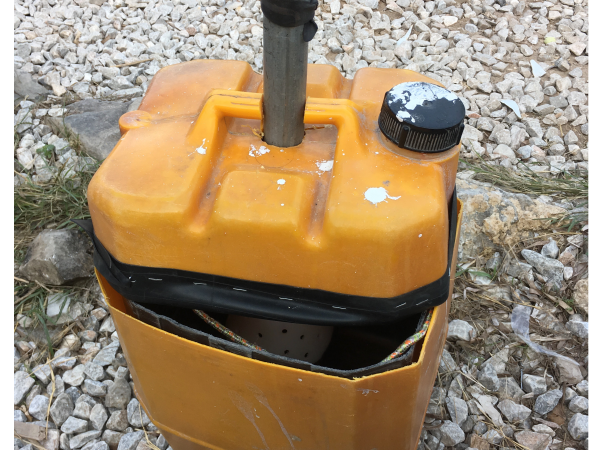
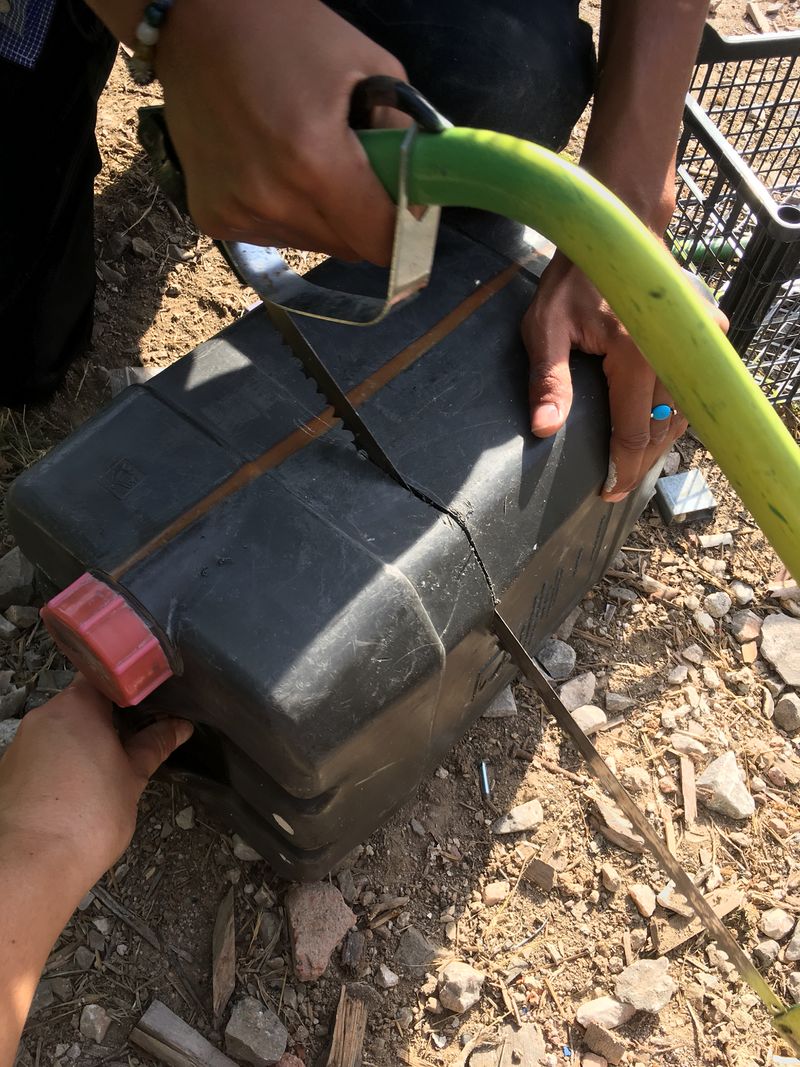
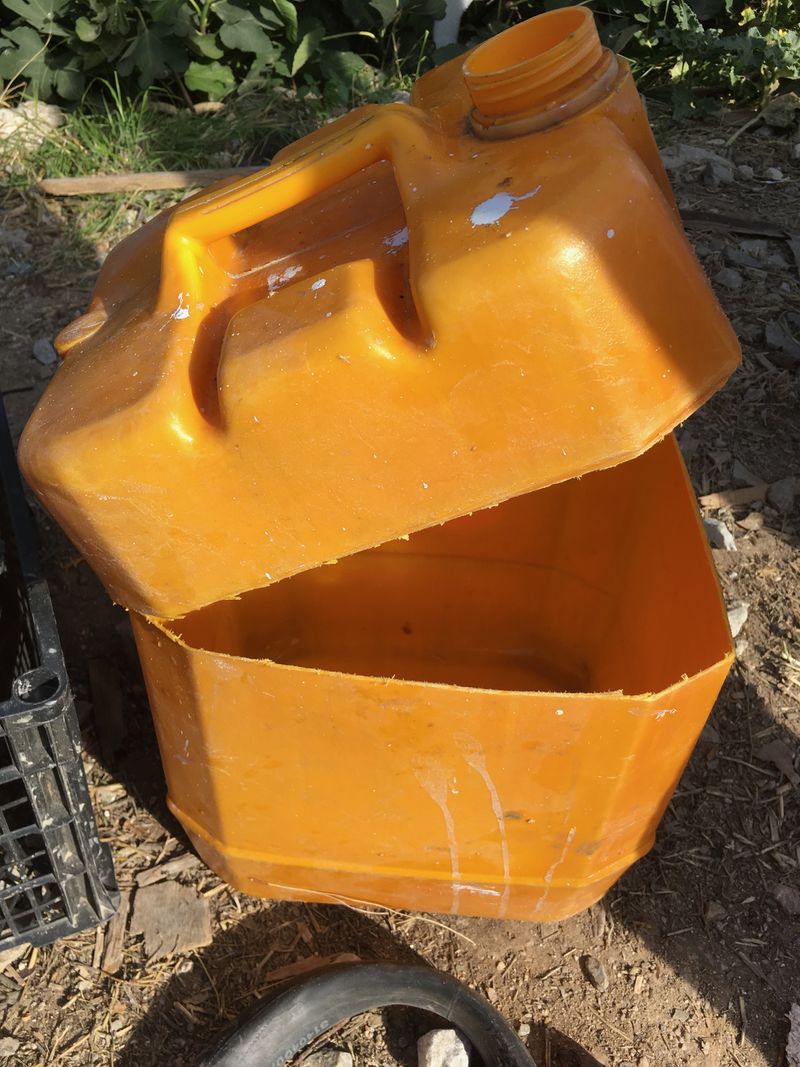
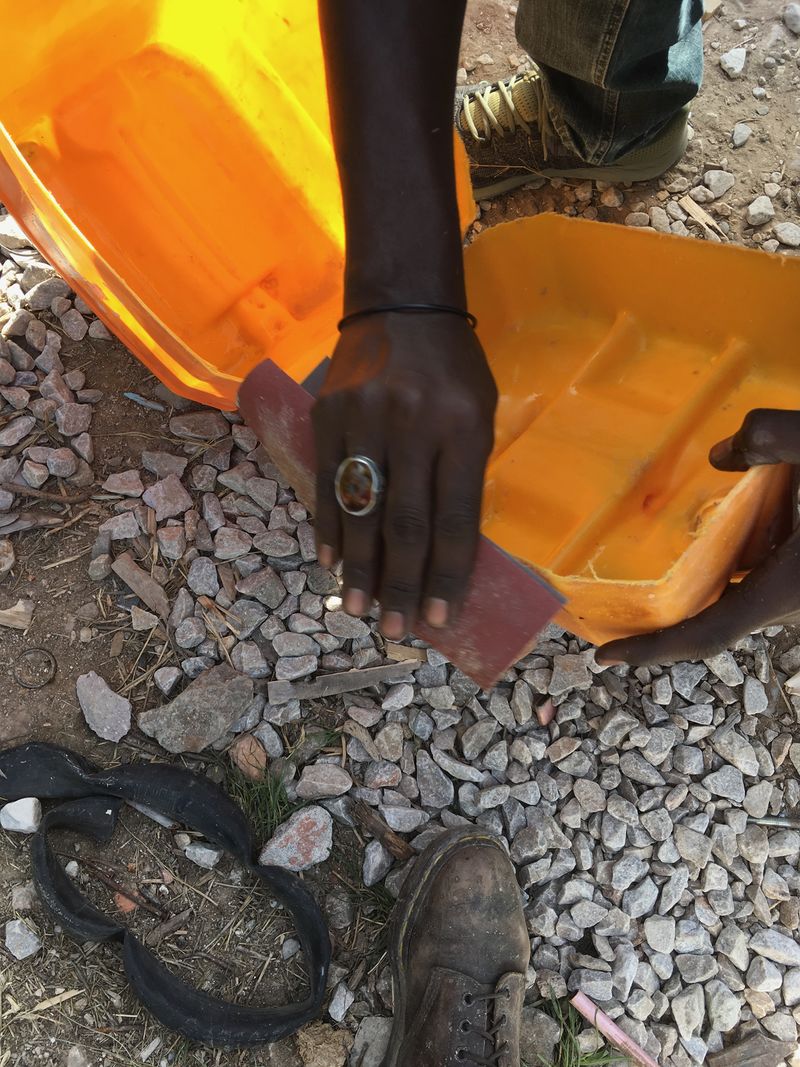
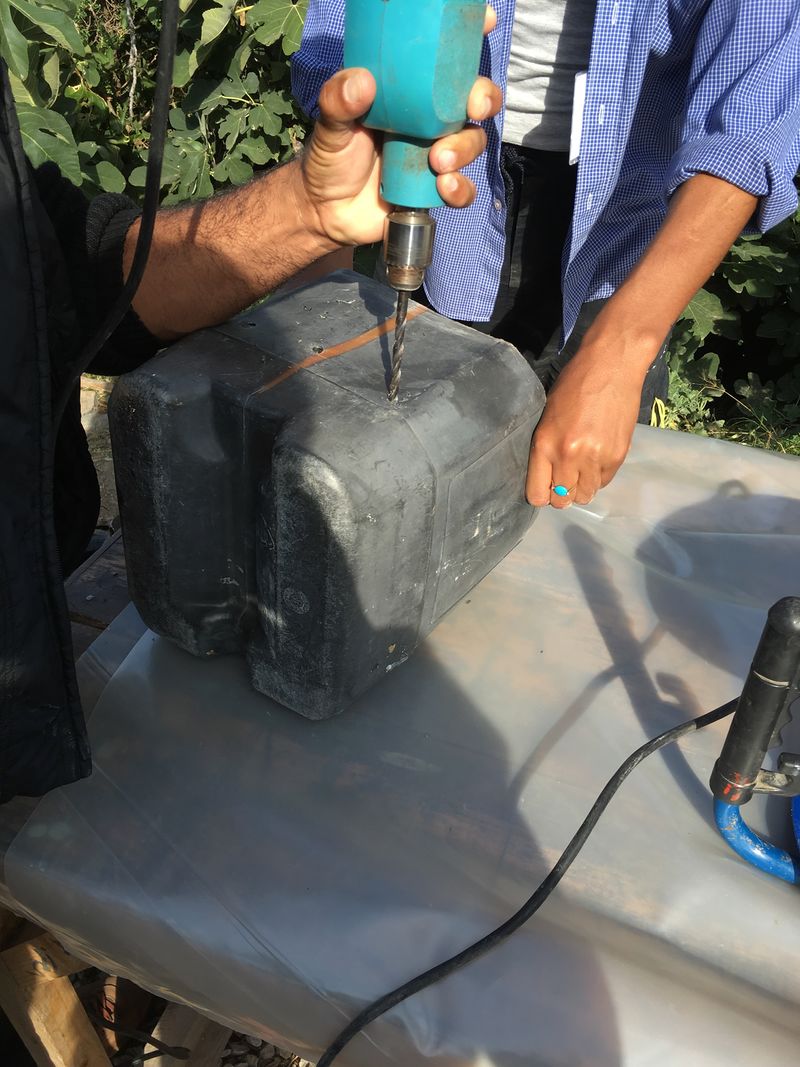
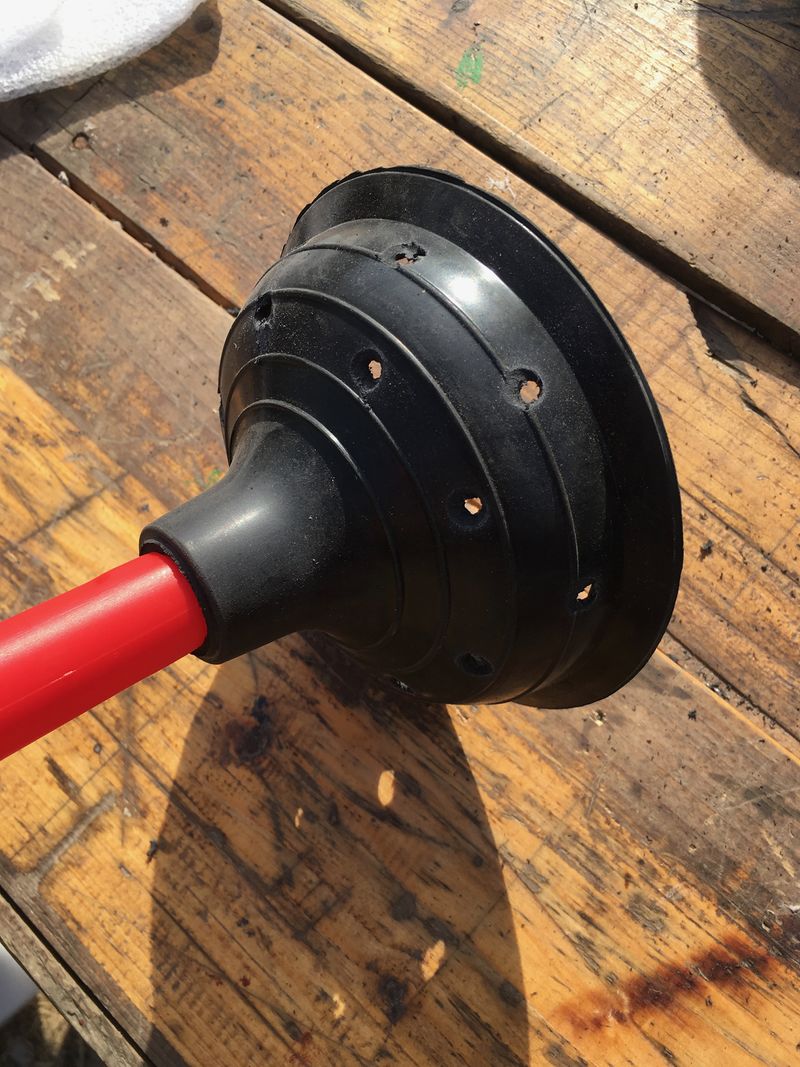
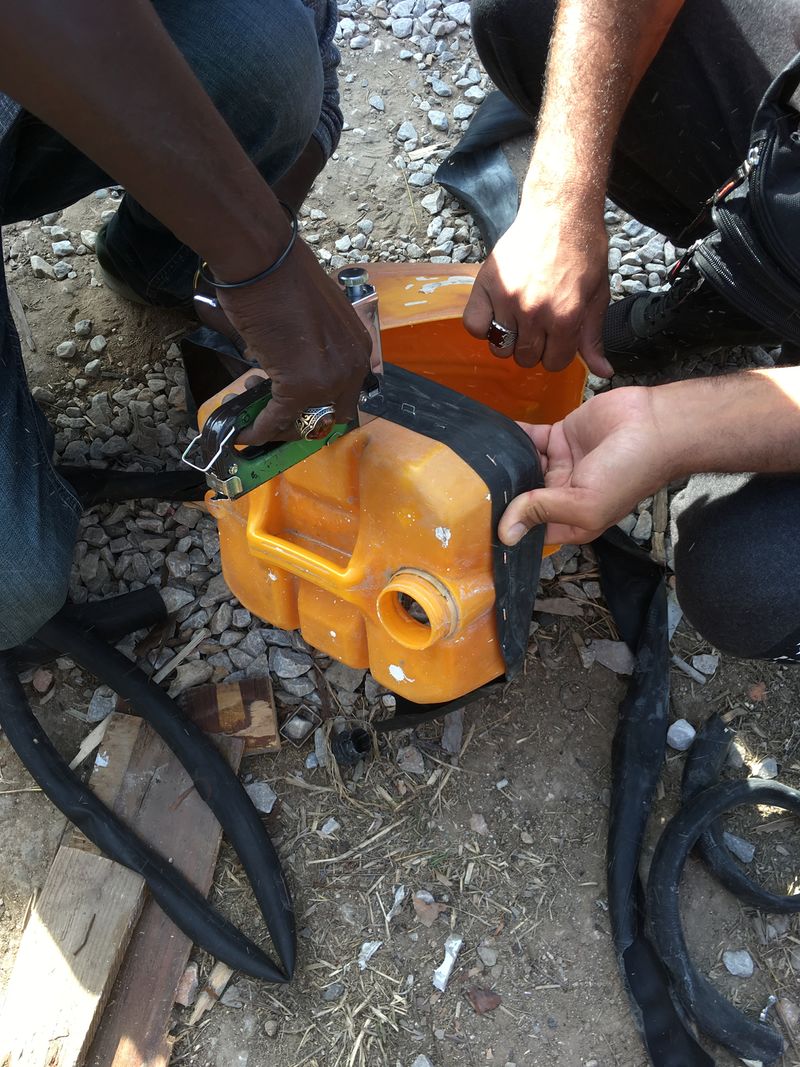
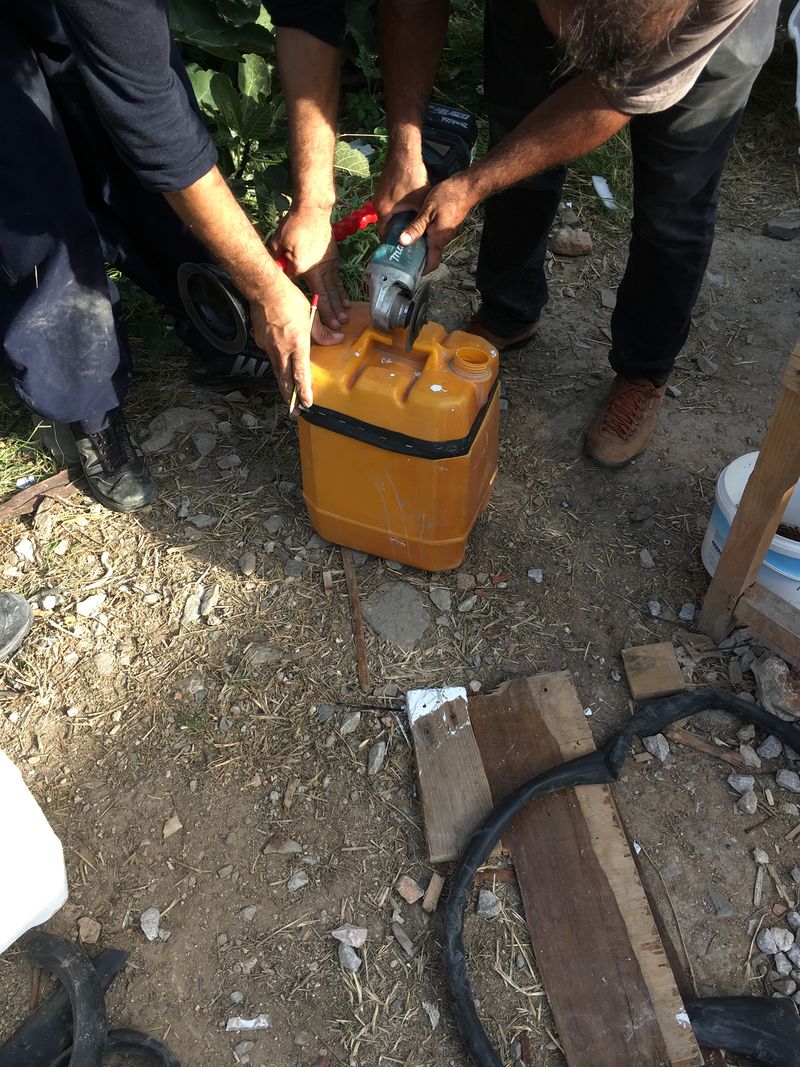
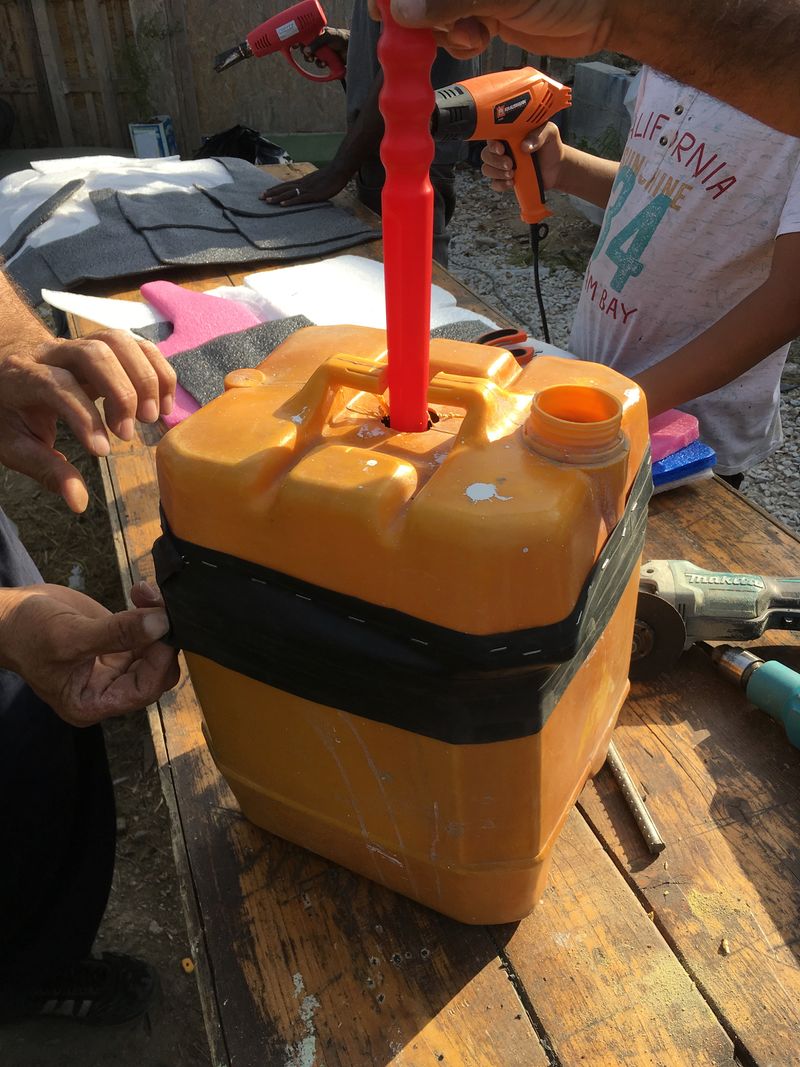
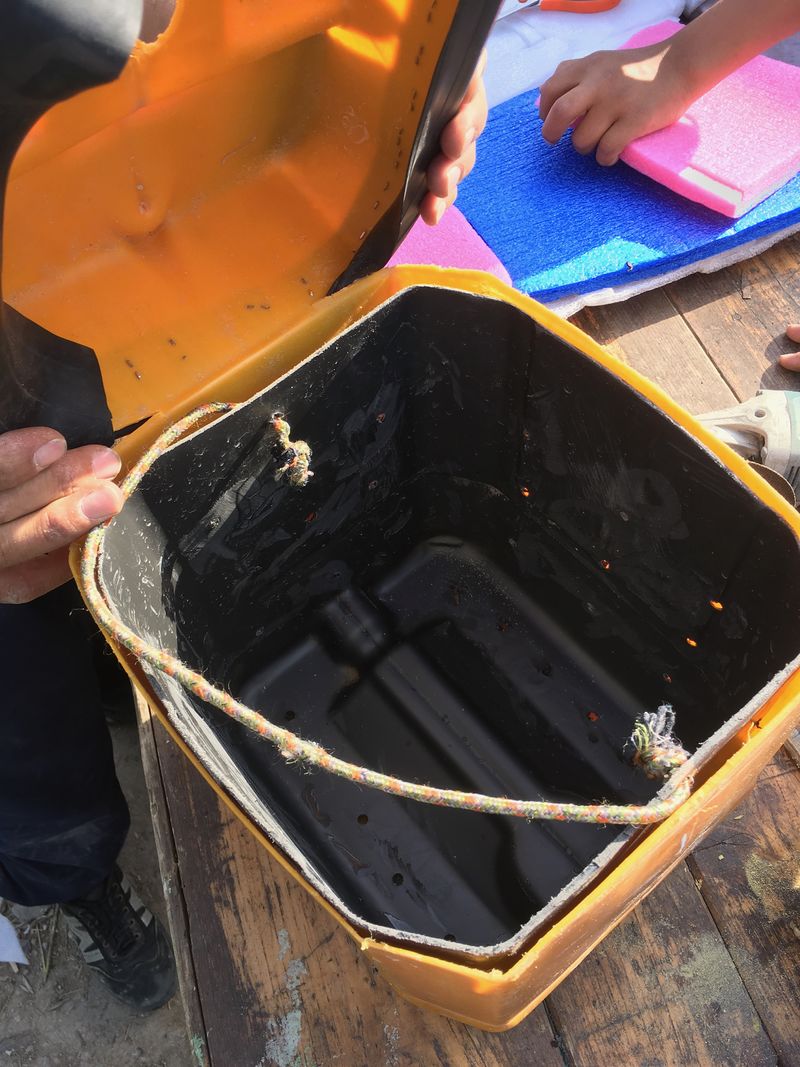
 Français
Français English
English Deutsch
Deutsch Español
Español Italiano
Italiano Português
Português